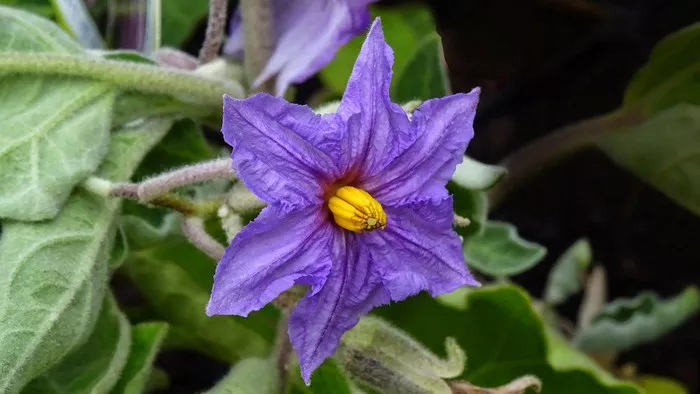Eggplants, also known as aubergines, are a staple in many cuisines around the world. Their glossy, purple skin and versatile flavor make them a favorite ingredient in dishes ranging from ratatouille to baba ganoush. But for those looking to cultivate their own eggplants, understanding the plant’s growth cycle is crucial. One of the key milestones in the eggplant’s growth journey is flowering, which marks the beginning of fruit development. In this comprehensive guide, we delve into the intricacies of eggplant flowering, exploring the factors that influence the timing of this crucial stage.
Understanding the Eggplant’s Growth Cycle
Before delving into the specifics of eggplant flowering, it’s essential to understand the plant’s overall growth cycle. Like many fruit-bearing plants, eggplants undergo several stages of growth, from seed germination to fruit ripening. These stages can vary in duration depending on factors such as temperature, moisture levels, and soil quality.
1. Seed Germination: The eggplant’s journey begins with the germination of its seeds. Under optimal conditions, eggplant seeds typically germinate within 7 to 14 days after planting. Adequate moisture, warmth, and soil drainage are essential for successful germination.
2. Seedling Stage: After germination, the eggplant seedlings emerge from the soil, sporting their characteristic cotyledon leaves. During this stage, the seedlings require ample sunlight and regular watering to support healthy growth. Seedlings usually develop their first true leaves within 2 to 3 weeks after germination.
3. Vegetative Growth: Once established, eggplant plants enter a phase of vegetative growth, characterized by the development of leaves, stems, and roots. During this stage, the plant focuses on building its structural framework and accumulating nutrients. Depending on environmental conditions, vegetative growth can last anywhere from 4 to 8 weeks.
4. Flowering: The flowering stage is a pivotal moment in the eggplant’s growth cycle, marking the transition from vegetative growth to fruit production. The timing of flowering is influenced by various factors, including temperature, day length, and plant maturity. Understanding these factors is crucial for predicting when eggplants will bloom.
5. Fruit Development: Following successful pollination, eggplant flowers give way to small, green fruits that gradually enlarge and mature. Fruit development can take several weeks, with eggplants reaching their full size and color once ripe. Adequate water, sunlight, and nutrient availability are essential for optimal fruit development.
6. Harvesting: The final stage of the eggplant’s growth cycle is harvesting, where mature fruits are carefully plucked from the plant for consumption. Harvesting timing can vary depending on personal preference and intended culinary use. Generally, eggplants are harvested when they reach their desired size and firmness.
Factors Influencing Eggplant Flowering
The timing of eggplant flowering is influenced by a combination of environmental factors and plant-specific characteristics. Understanding these factors can help growers anticipate when their eggplants will bloom and optimize growing conditions for successful fruit production.
Temperature: Eggplants thrive in warm temperatures, with the optimal range for flowering falling between 70°F to 85°F (21°C to 29°C). Cooler temperatures can delay flowering, while excessive heat can cause flowers to drop prematurely. Providing consistent temperatures within the optimal range encourages robust flowering.
Day Length: Eggplants are classified as short-day plants, meaning they initiate flowering when exposed to shorter daylight periods. As such, eggplant flowering tends to coincide with the onset of shorter days in late summer or early fall. In regions with mild winters, where day length remains relatively constant, flowering may occur year-round.
Plant Maturity: The age and maturity of the eggplant plant also play a significant role in flowering. Most eggplant varieties require approximately 50 to 80 days from transplanting to initiate flowering. Younger plants may take longer to reach maturity and begin flowering, while older, more established plants may flower sooner.
Nutrient Availability: Adequate nutrient availability is essential for promoting healthy flowering in eggplants. Phosphorus, in particular, plays a crucial role in flower formation and reproductive development. Ensuring proper soil fertility through organic amendments or balanced fertilization can support optimal flowering and fruit set.
Pollination: Successful pollination is essential for fruit production in eggplants. While eggplant flowers are self-pollinating, they may benefit from pollinator activity, such as bees and other insects. Providing a diverse garden ecosystem with ample floral resources can attract pollinators and enhance fruit set.
Tips for Promoting Eggplant Flowering
For growers looking to maximize eggplant production, several strategies can help promote robust flowering and fruit development.
Optimize Growing Conditions: Ensure that eggplants are grown in a location with full sun exposure and well-drained soil. Maintain consistent moisture levels throughout the growing season, avoiding both drought stress and waterlogged conditions.
Provide Nutrient Support: Conduct soil tests to assess nutrient levels and amend as necessary to provide adequate fertility. Incorporating organic matter such as compost or aged manure can improve soil structure and nutrient availability.
Manage Pests and Diseases: Monitor eggplants regularly for signs of pests and diseases, which can hinder flowering and fruit set. Implement integrated pest management strategies, including cultural, biological, and mechanical control methods, to minimize damage.
Prune for Air Circulation: Pruning excess foliage can improve air circulation around eggplant plants, reducing the risk of fungal diseases and promoting healthier growth. Focus on removing dead or diseased branches and thinning crowded areas to allow light penetration.
Support Pollinator Populations: Create a pollinator-friendly environment by planting a diverse array of flowering plants alongside eggplants. Avoid the use of pesticides that may harm beneficial insects and provide nesting sites for solitary bees and other pollinators.
Conclusion
Eggplant flowering marks a significant milestone in the plant’s growth cycle, signaling the beginning of fruit production. By understanding the factors that influence flowering timing and implementing appropriate management strategies, growers can optimize growing conditions and promote robust fruit development. From temperature and day length to nutrient availability and pollination, each factor plays a crucial role in ensuring successful eggplant cultivation. With proper care and attention, gardeners can enjoy a bountiful harvest of delicious eggplants to savor and share with others.


